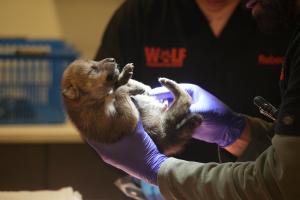
Endangered Wolf Pups Born in New York Fostered into Wild Dens in New Mexico
Born on April 24 to parents Trumpet and Lighthawk at the Wolf Conservation Center, located in South Salem, New York, the pups were soon named by our dedicated supporters. The boy, Brutus, was inspired by a well-known Arctic gray wolf admired for his strength and presence. His sister Gaan draws her name from the sacred Apache Gaan dancers, known for their protective and healing roles.
The primary goal of the Wolf Conservation Center’s participation in the Saving Animals From Extinction (SAFE) program is to recover endangered wild wolf populations. Mexican gray wolf adult and family group releases to the wild began in 1998 and although releases look a bit different now, they still occur via pup fosters. Captive-to-wild fostering is a coordinated effort by the Mexican Wolf Interagency Field Team (IFT) and the SAFE program and allows genetically valuable captive-born pups to become integrated into the wild Mexican wolf population.
With the assistance of LightHawk Conservation Flying, a nonprofit aviation organization supporting conservation efforts, and Dr. Jim Micinilio, the two pups flew from New York to New Mexico, where they were met by the IFT and taken to wild wolf dens.
“We’re honored to be a part of this important mission,” stated WCC Curator Rebecca Bose. “The collaboration among all who had a hand in delivering Brutus and Gaan to their wild families is a true testament to the dedication of everyone involved, and a testament to the family-oriented nature of wolves.”
Wolves are incredibly social, family-oriented animals known for their strong pack bonds and cooperative nature. One of the most remarkable aspects of their behavior is their willingness to care for pups that aren't their own. This natural instinct to nurture and protect is what makes the fostering process possible. When a wild wolf mother returns to her den to find additional pups, she doesn’t reject them– instead, she instinctively accepts them as part of her litter, feeding and caring for them as if they were her own. Over the next few months, the IFT will offer supplementary food caches for the family – a thank you, in a sense, for feeding extra mouths.
Join us in sending congratulatory howls to the pups in New Mexico, and please send loving howls to Trumpet; she has fostered 14 pups to wild dens over the years. Hopefully we’ll one day see adults and family groups released again – methods that would truly improve genetic diversity in the wild and would keep families intact.
For two decades, the WCC has been a critical partner in the Mexican Gray Wolf Recovery Program, and to date, three adult Mexican gray wolves and 14 pups from the center have been released in the wild.
“Fostering a wolf pup born in captivity into a wild den is a vital part of our efforts to increase the number of wolves in the wild. This process requires precise coordination among many dedicated stakeholders and carries both significant challenges and impact. We remain committed to using this method—along with every conservation tool available—to protect the fragile but growing population of wild Mexican gray wolves and help return them to their ancestral home,” Leila Wetmore, WCC CEO.
About Mexican Gray Wolves
The Mexican gray wolf (Canis lupus baileyi) or “lobo” is the most genetically distinct lineage of gray wolves in the Western Hemisphere, and one of the most endangered mammals in North America. By the mid-1980s, hunting, trapping, and poisoning caused the extinction of lobos in the wild, with only a handful remaining in captivity. In 1998 the wolves were reintroduced into the wild as part of a federal reintroduction program under the Endangered Species Act. Today in the U.S., there is a single wild population of 286 individuals – an increase from the 257 counted at the end of 2023.
About the Wolf Conservation Center
Founded in 1999, the Wolf Conservation Center envisions a world where wolves thrive. We work to advance the survival of wolves by inspiring a global community through education, advocacy, research, and recovery.
Jordan Arena
Wolf Conservation Center
+1 914-763-2373
email us here
Visit us on social media:
Bluesky
Instagram
Facebook
Distribution channels: Agriculture, Farming & Forestry Industry, Education, Environment, Science
Legal Disclaimer:
EIN Presswire provides this news content "as is" without warranty of any kind. We do not accept any responsibility or liability for the accuracy, content, images, videos, licenses, completeness, legality, or reliability of the information contained in this article. If you have any complaints or copyright issues related to this article, kindly contact the author above.
Submit your press release


